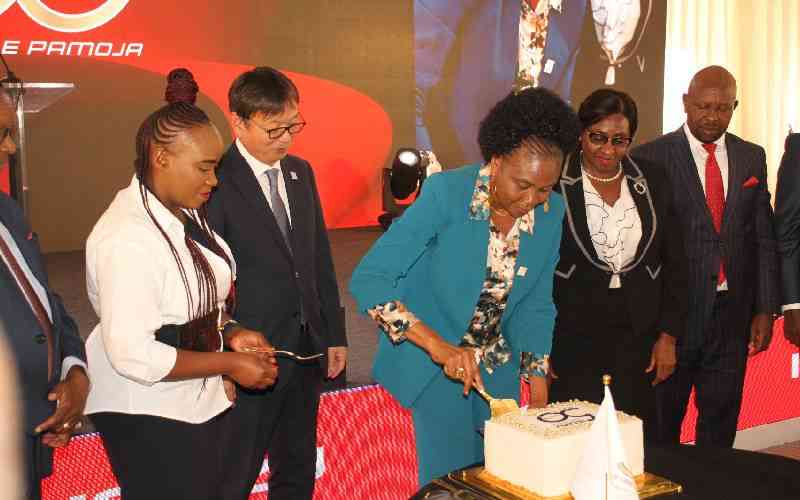Isuzu East Africa Managing Director Rita Kavashe during the company’s 50th Anniversary celebrations in Nairobi, on September 3, 2025. [Edward Kiplimo, Standard]
Kenya is drafting a Bill linking tax breaks to local car parts sourcing to revive vehicle assembly and speed up the shift to electric mobility.
Industry Principal Secretary Juma Mukhwana on Wednesday said the legislation will build on an automotive policy already approved by Parliament and enforce the “Buy Kenya, Build Kenya” directive by raising local content in manufacturing.
“The more you buy locally, the less tax you pay,” Mukhwana explained, noting that the bill will tie incentives to sourcing parts from Kenyan suppliers.
Follow The Standard
channel
on WhatsApp
The PS made the remarks during celebrations marking Isuzu East Africa’s 50th anniversary in Nairobi.
The proposed law will also strengthen a government requirement that 40 per cent of public vehicle purchases come from local assemblers.
It includes measures to promote electric vehicle production, aligning with Kenya’s climate change commitments.
Kenya’s auto industry, once weakened by a surge of used car imports in the 1990s, has in recent years received renewed policy support for local assembly.
Isuzu East Africa Chief Executive Rita Kavashe traced the company’s history to 1975 when General Motors Kenya was formed as a joint venture with the government to spur industrialisation.
She recalled the sector’s heyday when Kenya even produced a national car, the Uhuru, and its near collapse in the 1990s before policy reforms under Vision 2030 revived local assembly. Isuzu East Africa Managing Director Rita Kavashe and Japanese Ambassador to Kenya Matsuura Hiroshi, during the company’s 50th Anniversary celebrations in Nairobi, on September 3, 2025. [Edward Kiplimo, Standard]
Kavashe highlighted that Isuzu has expanded its regional network from 13 to 93 outlets, introduced financing models for schools, farmers and small businesses and invested more than Sh7 billion in plant upgrades and a new parts distribution centre.
The company now holds a 54 per cent market share and has created more than 1,000 direct jobs with thousands more supported in the supply chain.
She announced plans to begin assembling the Isuzu MU‑X SUV locally later this year, making all the company’s products Kenyan-built.
Isuzu, she added, is positioning to grow exports under the African Continental Free Trade Area.
“Kenya remains our home and the gateway to the region, and we intend to anchor our growth here,” Kavashe told the gathering, adding that the firm is also exploring fuel-efficient and lower-emission technologies in line with its environmental goals.
Follow The Standard
channel
on WhatsApp
Isuzu East Africa Managing Director Rita Kavashe during the company’s 50th Anniversary celebrations in Nairobi, on September 3, 2025.
[Edward Kiplimo, Standard]
Kenya is drafting a Bill linking tax breaks to local car parts sourcing to revive vehicle assembly and speed up the shift to electric mobility.
Industry Principal Secretary Juma Mukhwana on Wednesday said the legislation will build on an automotive policy already approved by Parliament and enforce the “Buy Kenya, Build Kenya” directive by raising local content in manufacturing.
“The more you buy locally, the less tax you pay,” Mukhwana explained, noting that the bill will tie incentives to sourcing parts from Kenyan suppliers.
Follow The Standard
channel
on WhatsApp
The PS made the remarks during celebrations marking Isuzu East Africa’s 50th anniversary in Nairobi.
The proposed law will also strengthen a government requirement that 40 per cent of public vehicle purchases come from local assemblers.
It includes measures to promote electric vehicle production, aligning with Kenya’s climate change commitments.
Kenya’s auto industry, once weakened by a
surge of used car imports
in the 1990s, has in recent years received renewed policy support for local assembly.
Isuzu East Africa Chief Executive Rita Kavashe traced the company’s history to 1975 when General Motors Kenya was formed as a joint venture with the government to spur industrialisation. Isuzu East Africa Managing Director Rita Kavashe and Japanese Ambassador to Kenya Matsuura Hiroshi, during the company’s 50th Anniversary celebrations in Nairobi, on September 3, 2025. [Edward Kiplimo, Standard]
She recalled the sector’s heyday when Kenya even produced a national car, the Uhuru, and its near collapse in the 1990s before policy reforms under Vision 2030 revived local assembly.
[Edward Kiplimo, Standard]
Kavashe highlighted that Isuzu has expanded its regional network from 13 to 93 outlets, introduced financing models for schools, farmers and small businesses and invested more than Sh7 billion in plant upgrades and a new parts distribution centre.
The company now holds a 54 per cent market share and has created more than 1,000 direct jobs with thousands more supported in the supply chain.
She announced plans to begin assembling the Isuzu MU‑X SUV locally later this year, making all the company’s products Kenyan-built.
Stay informed. Subscribe to our newsletter
Isuzu, she added, is
positioning to grow exports
under the African Continental Free Trade Area.
“Kenya remains our home and the gateway to the region, and we intend to anchor our growth here,” Kavashe told the gathering, adding that the firm is also exploring fuel-efficient and lower-emission technologies in line with its environmental goals.
Follow The Standard
channel
on WhatsApp
By David Njaaga


